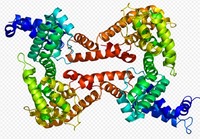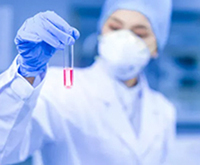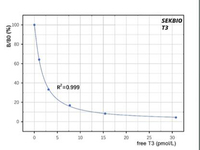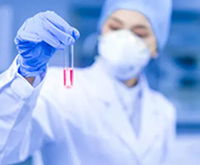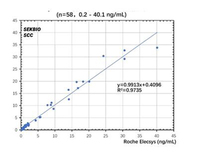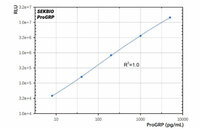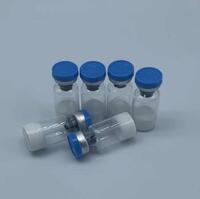Human Progastrin-releasing Peptide (ProGRP)
Product Quick Detail
- Minimum Order
- 1
- Packaging
- N/A
- Delivery
- 15 Days
Specifications
ProGRP tumormarker is a recently identified biomarker of small cell lung cancer (SCLC). ProGRP tumor marker is a precursor of a neuropeptide hormone called a gastrin-releasing peptide (GRP), and
SCLC cells frequently produce it.
Circulating proGRP levels serve as a reliable marker in patients with SCLC and are the most sensitive marker for discriminating SCLC 16 from benign lung diseases.
ProGRP marker is rarely elevating in patients with other malignancies or mild conditions except in patients with renal insufficiency, neuroendocrine tumors of the lung, and medullary carcinoma of
the thyroid.
SEKBIO is now offering Mouse anti-human ProGRP mAb, Humanized anti-human ProGRP mAb, and Recombinant human proGRP 31-98 fragment (Prokaryotic expression).
ProGRP Tumor Marker Intro
The progastrin-releasing peptide is a novel small-cell lung cancer marker. PRO GRP tumor marker is a brain-gut hormone. Like a small cell lung cancer marker, PRO GRP marker has the following
characteristics: 1. It has very high specificity for small cell lung cancer; 2. It has a higher positive rate in earlier cases; 3. The blood concentration of healthy people and patients is very
different, so Detection reliability is increased.
ProGRP is a specific tumor marker for SCLC, which has advantages over other tumor markers in tumor specificity, progastrin releasing peptide amount, and organ specificity. In addition, the
concentration of ProGRP in the blood is less affected by factors such as activity and diet, with slight fluctuation during the day, and hemolysis has little effect on its test results. Therefore,
ProGRP is useful for monitoring SCLC patients undergoing treatment and detecting relapse cases.
ProGRP Tumor Marker Function
The kidney is one of the main metabolic pathways of progrp assay antibody in the body, and renal insufficiency is an important reason for increasing ProGRP levels. Therefore, the influence of renal
dysfunction should be excluded when ProGRP is used to assist in the diagnosis of SCLC. When the patient's creatinine concentration was >140 μmol/L, the progrp test antibody level increased.
Therefore, detecting the ProGRP concentration should check the patient's renal function at the same time to exclude the elevated ProGRP concentration caused by chronic renal disease.
For more information about tumor antigens, please feel free to contact us!
- Country: China (Mainland)
- Business Type:
- Market:
- Founded Year:
- Address:B503, Building 1, Phase II, Yinxing Science and Technology Park, Guanlan, Shenzhen, China
- Contact:sekbio .com
Other products from Shenzhen SEKBIO Co., Ltd
Relate products of Human Progastrin-releasing Peptide (ProGRP)
Mouse Anti-human ProGRP mAb
Pprogrp antibody Name: Mouse anti-human ProGRP mAb Catalog No.: ZLA116-1M Description: Mouse mAb Epitope: 48-52 As a professional tumor marker factory, SEKBIO has high-quality infectious markers for sale. Welcome to contact us if needed. ...
Hot Selling High Quality H 100ui / Vial Human Peptides Growth Muscle
How to make an order : 1. Name what your need ( which product , quantity ) 2. Full payment would be done once we come to an agreement on all details . 3. Parcel would be shipped out upon receipt of payment . 4. Info about parcel would be offered ( Photo , tracking number ) 5. ...


